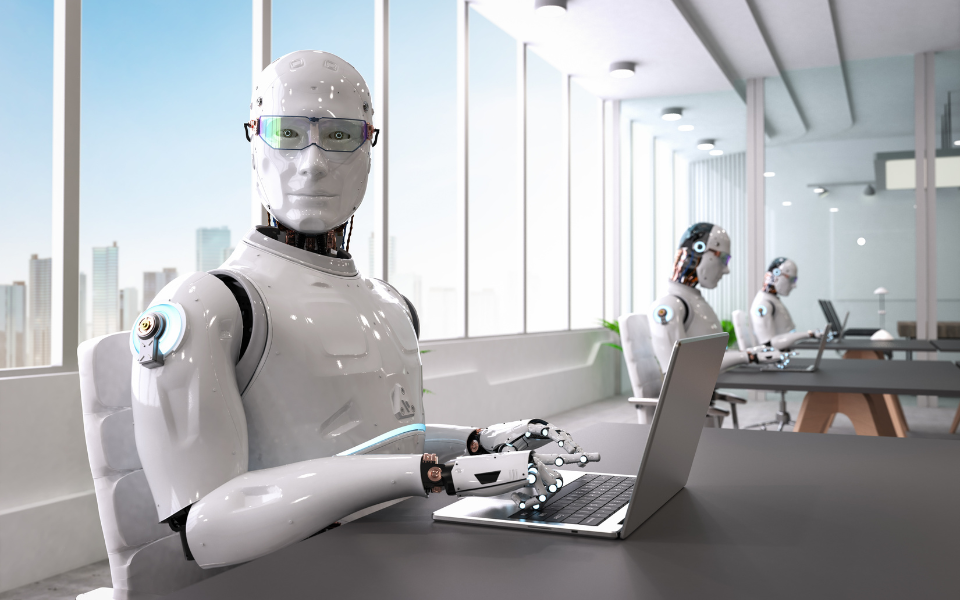Artificial Intelligence (AI) has rapidly evolved from a futuristic concept to a fundamental component reshaping various industries. From automating mundane tasks to enabling complex decision-making, AI is transforming the way we work and deliver services. This article explores how AI is revolutionizing the workplace, enhancing productivity, and paving the way for innovative delivery methods.
Annotation involves adding notes or comments to a text, image, or dataset to provide additional information, explanations, or context. In various fields like literature, research, and data science, annotations help clarify meaning, highlight important details, and facilitate better understanding and analysis of the content.
The Integration of AI in the Workplace
Automating Routine Tasks
Increased Efficiency
AI technologies, such as robotic process automation (RPA), can handle repetitive tasks like data entry, scheduling, and customer inquiries. This automation increases efficiency by freeing up human employees to focus on more strategic, creative, and high-value activities.
Reduced Human Error
AI systems are designed to perform tasks with high precision, significantly reducing the likelihood of errors. This accuracy is crucial in sectors like healthcare, finance, and logistics, where mistakes can have severe consequences.
Enhancing Decision-Making
Data-Driven Insights
AI algorithms can analyze vast amounts of data quickly and accurately, providing actionable insights that inform decision-making. For example, in marketing, AI can identify consumer trends and preferences, enabling companies to tailor their strategies more effectively.
Predictive Analytics
AI’s predictive capabilities allow businesses to anticipate future trends and behaviors. In supply chain management, for instance, AI can forecast demand, optimize inventory levels, and reduce costs by predicting disruptions and suggesting preemptive measures.
Transforming Service Delivery
Personalized Customer Experiences
Customized Interactions
AI-driven customer service platforms can provide personalized experiences by understanding and predicting individual customer needs. Chatbots and virtual assistants, powered by natural language processing (NLP), can offer tailored responses and solutions, enhancing customer satisfaction.
Real-Time Support
AI enables real-time customer support, ensuring that queries are addressed promptly and accurately. This immediate assistance improves the overall customer experience and fosters loyalty.
Optimizing Logistics and Supply Chain
Efficient Route Planning
AI can optimize logistics by analyzing traffic patterns, weather conditions, and delivery schedules to determine the most efficient routes. This optimization reduces delivery times, lowers fuel consumption, and minimizes operational costs.
Inventory Management
AI-powered inventory management systems can track stock levels in real-time, predict demand fluctuations, and automate reordering processes. This ensures that businesses maintain optimal inventory levels, reducing the risk of stockouts or overstocking.
Enhancing Workforce Capabilities
Augmented Intelligence
Collaborative AI
Rather than replacing humans, AI often augments human capabilities, enabling better collaboration between humans and machines. AI tools can assist workers by providing relevant information, suggesting solutions, and performing complex calculations, enhancing overall productivity.
Skill Development
AI can also play a role in workforce development by identifying skill gaps and recommending personalized training programs. This continuous learning approach helps employees stay relevant in a rapidly changing job market.
Flexible Work Environments
Remote Work Solutions
AI technologies facilitate remote work by providing tools for virtual collaboration, project management, and performance tracking. These solutions enable employees to work effectively from anywhere, promoting work-life balance and increasing job satisfaction.
Intelligent Workspaces
AI can enhance physical workspaces through smart building technologies that adjust lighting, temperature, and other environmental factors based on occupancy and preferences. These intelligent workspaces improve comfort and productivity.
Ethical Considerations and Challenges
Ensuring Fairness and Transparency
Bias Mitigation
AI systems can unintentionally perpetuate biases present in their training data. Ensuring fairness and transparency in AI algorithms is crucial to avoid discriminatory outcomes. Companies must implement rigorous testing and validation processes to mitigate bias.
Accountability
Clear accountability frameworks are necessary to address ethical concerns related to AI deployment. Organizations should establish guidelines that define responsibility for AI-driven decisions and actions, ensuring ethical use of technology.
Privacy and Security
Data Protection
AI relies on vast amounts of data, raising concerns about privacy and data security. Companies must adopt robust data protection measures, including encryption, anonymization, and secure data storage, to safeguard sensitive information.
Cybersecurity
As AI systems become more integrated into business operations, they also become targets for cyberattacks. Investing in advanced cybersecurity measures is essential to protect AI infrastructure and maintain the integrity of AI-driven processes.
Future Prospects and Innovations
Continuous Advancements
Evolving AI Technologies
The field of AI is continually advancing, with new technologies and applications emerging regularly. Innovations such as quantum computing and advanced neural networks promise to further enhance AI capabilities, driving even greater transformations in the workplace and service delivery.
Cross-Industry Applications
AI’s impact is not limited to specific industries; its applications span across various sectors, including healthcare, finance, manufacturing, and entertainment. The versatility of AI ensures its relevance and significance in diverse fields, fostering cross-industry collaboration and innovation.
Human-Centric AI
User-Friendly Interfaces
Future AI developments will likely focus on creating more user-friendly interfaces, making AI tools accessible to a broader audience. Simplified interfaces will empower more employees to leverage AI in their daily tasks, democratizing access to advanced technologies.
Ethical AI Development
The ongoing dialogue around AI ethics will shape future developments, emphasizing the creation of AI systems that prioritize human values and ethical principles. This human-centric approach will ensure that AI serves as a beneficial tool for society.
Conclusion
AI is undeniably reshaping the way we work and deliver services, driving efficiency, innovation, and enhanced customer experiences. By automating routine tasks, enabling data-driven decision-making, and personalizing interactions, AI empowers businesses to achieve new levels of productivity and success. However, ethical considerations and challenges must be addressed to ensure the responsible and fair use of AI. As AI technologies continue to evolve, their potential to transform industries and improve lives will only grow, marking a new era in the way we work and deliver through AI.
